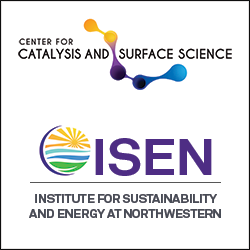Center for Catalysis & Surface Science Seminar (Yuri Grin)

When:
Monday, August 20, 2018
2:00 PM - 3:00 PM CT
Where: Ryan Hall, 4003, 2190 Campus Drive, Evanston, IL 60208 map it
Audience: Faculty/Staff - Student - Post Docs/Docs - Graduate Students
Cost: Free
Contact:
Jeff Henderson
(847) 467-1972
jeffhenderson@northwestern.edu
Group: Trienens Institute
Category: Lectures & Meetings
Description:
"Atomic Interactions and Chemical Properties of Intermetallic Compounds"
Prof. Yuri Grin, Max Planck Institute for Chemical Physics of Solids, Dresden, Germany
Monday, August 20th at 2:00 PM
Ryan Hall, Rm. 4003
ABSTRACT: Intermetallic compounds are formed by elements located left from the Zintl line in the Periodic Table. For interpretation of their chemical properties a better understanding of the composition and bonding in crystal structures of these substances is necessary. Especially the chemical bonding in intermetallic compounds is a rather open question. An application of new quantum-chemical tools in real space like electron localizability approach opens the way to real-space definition of the basic categories for chemical bonding description like covalence or ionicity or polarity. Almost all chemical processes require efficient, cheap, and concurrently environmentally friendly catalysts. Intermetallic compounds (IMCs) with their unique crystal structure and peculiar chemical bonding, enable chemical properties design and their application in catalysis. For example, use of Pd–Ga binary compounds as catalysts for acetylene semihydrogenation allowed an improvement of selectivity towards ethylene up to 70–80% instead of 20% for Pd/Al2O3 and 50% for alloy Ag80Pd20, as well as an idea for synthesis of efficient, noble metal-free Fe4Al13 catalyst for this process. Nevertheless, exploring the area of IMCs application to more oxidative conditions makes stability one of the key issues. The chemical behaviour of CaAg as catalyst for ethylene epoxidation was studied using a combination of experimental and quantum chemical techniques. Under oxidative ethylene epoxidation conditions, the CaAg (010) surface possesses an outstanding stability during long-term experiments. This is caused by the anisotropy of chemical bonding and the formation of a highly ordered, stable and dense CaO layer with a small amount of embedded Ag atoms which prevents further oxidative decomposition.
The Center for Catalysis and Surface Science (CCSS) is a strategic research center within the Institute for Sustainability and Energy at Northwestern (ISEN). CCSS promotes interdisciplinary research fundamental to the discovery and atomistically-controlled synthesis of catalysts that optimize the sustainability of industrial and consumer goods.